Wonder Woman
 for sequences of violence and action, and some suggestive content.
for sequences of violence and action, and some suggestive content.
Reviewed by: Blake Wilson
CONTRIBUTOR
| Moral Rating: | Average |
| Moviemaking Quality: |
|
| Primary Audience: | Adults Young-Adults Teens |
| Genre: | Superhero Fantasy War Action Adventure |
| Length: | 2 hr. 21 min. |
| Year of Release: | 2017 |
| USA Release: |
June 2, 2017 (wide—4,165 theaters) DVD: September 19, 2017 |
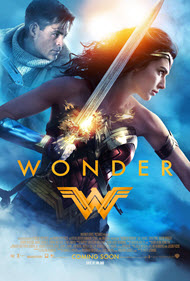

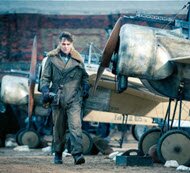
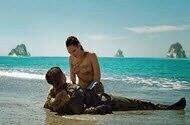
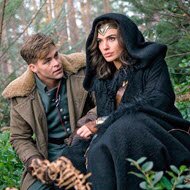
Biblical women with admirable character, include: Mrs. Noah, Mary (mother of Jesus), Esther, Deborah, and Milcah, daugher of Zelophehad
What is goodness? And righteousness?
Biblical super strength: Samson
Courage / bravery / self-sacrifice
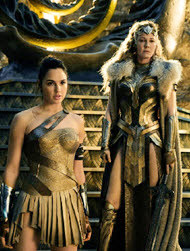
Greek pagan mythology and idolatry
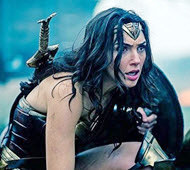
Feminist subtext of the film—What about Feminism and Women’s Lib?
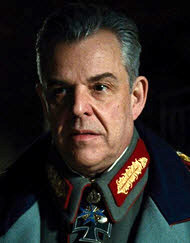
the horrors of World War I
What is the Biblical perspective on war? Answer
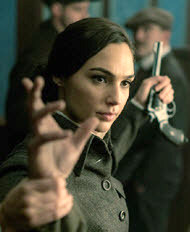
WHO IS GAL GADOT?
She is an Israeli model, former Miss Israel and now an actress who served in the Israeli army as a combat instructor. She is married to multi-millionaire Israeli real estate developer Yaron Varsano. Their faith is Judaism, but they met at a retreat for yoga, chakras and healthy eating. They are based in Tel Aviv.
| Featuring |
|---|
|
Gal Gadot … Diana Prince / Wonder Woman Chris Pine … Steve Trevor Robin Wright … General Antiope David Thewlis … Sir Patrick Connie Nielsen … Queen Hippolyta Elena Anaya … Maru / Doctor Poison Lucy Davis … Etta Candy Doutzen Kroes … Venelia Ewen Bremner … Charlie Danny Huston … General Erich Ludendorff Mayling Ng … Orana See all » |
| Director |
| Patty Jenkins — “Monster” (2003) |
| Producer |
|
Charles Roven Deborah Snyder See all » |
| Distributor |
Sequel: “Wonder Woman 84” (2020)
On the secret island of Themyscira, Diana (Gal Gadot) is raised among a group of women warriors named the Amazons. When she grows up, something unusual happens. A man finds the island! Steve Trevor (Chris Pine), an American spy working for the British army, crashes his plane into the sea. Diana saves his life, only to unintentionally bring additional trouble.
It turns out, a German brigade chased Captain Trevor to the island. After a scuffle with the Amazons that causes catastrophe on both sides, Captain Trevor is held captive by the Amazons until they know his mission. Using the “lasso of truth,” he tells Diana and the Amazons about World War I, and all the devastation it has caused. Upon hearing this, Diana believes that the war is being caused by Ares, the Greek god of war who has the power to influence others for his benefit. In the meantime, he also reportedly killed many other gods in the past.
Diana decides to leave Themyscira to try and stop Ares. But, trying to adjust to a world completely different than hers, as well as trying to stop a world war is going to prove more challenging than she would ever imagine.
Entertainment Quality
For the most part, the film’s action scenes are a refreshing break from the CGI-heavy effects of recent action blockbusters. The battle scenes are pulse-pounding, painstakingly well-shot, and succeeded in keeping me glued to the screen. It’s only at the very end when things finally start relying a little too heavily on CGI effects. The script is tight and to the point. It also wisely avoids spending too much time on backstory as well as trying to connect the dots with past and future DC movies. As we get to the end, the script brings in some surprising depth that I haven’t often found in superhero films.
Following her first appearance as the character in “Batman v. Superman,” Gadot once again shines. She does a terrific job of depicting the multi-faceted personality for which Diana/Wonder Woman is known. From her kindness and innocence to her toughness and unwavering bravery, she does a great job. Pine also gives a great performance as Captain Trevor, with some heart and humor along the way. Robin Wright and Connie Nielsen play Diana’s aunt and mom (Queen Hippolyta), and despite relatively limited screentime, they are both convincing. Also, Lucy Davis provides a few humorous moments as Captain Trevor’s secretary, Etta Candy. She isn’t given a lot to do, however, and I would have liked to hear more from her.
Rupert Gregson-Williams” music score often soars. The costumes and sets are all fantastic. The contrast of colors between the bright, peaceful Themyscira and the darkness of Earth during wartime is well done. One other worthy note here is that with a female director (…Patty Jenkins) and female lead, I was a little concerned that the film could have chosen to limit men or treat them as dimwitted or not as strong as the females involved. I will say, I was pleasantly surprised. Jenkins portrays Captain Trevor to be just as much of a hero as Diana herself. And other male soldiers that fight in the war are also portrayed respectfully.
Positive Messages
For the most part, Diana represents a true, honest hero. She looks out for others ahead of herself, and only desires to protect the world. She cares for everyone who comes to know her. We see her devastated and nearly moved to tears by observing all the injured in the war. In many ways, she looks at the world with a naiveté similar to Giselle from “Enchanted.” Ultimately, her selflessness and love for humanity is very inspiring and brings to mind 1 Corinthians 13.
“Love suffers long and is kind;
love does not envy;
love does not parade itself, is not puffed up;
does not behave rudely, does not seek its own, is not provoked, thinks no evil;
does not rejoice in iniquity, but rejoices in the truth;
bears all things, believes all things, hopes all things, endures all things.”
—1 Corinthians 13:4-7 NKJV
Characters repeatedly sacrifice their lives to save others. The movie goes into a surprisingly thoughtful discussion about how honest love makes a real difference in the world.
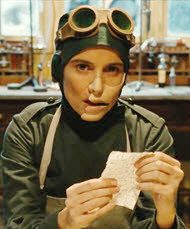
Wonder Woman is given the chance to destroy a human villain [a female], before ultimately deciding not to. She is scolded for this decision, and is told, “They don’t deserve your protection!”
She replies, “It’s not about deserving, it’s about what you believe. And I believe in love.” Later she admits, “I believe only love can save the world.”
As Christians, we know that to be true. I thought about John 3:16, as it shows that God’s love for imperfect beings truly made a difference and redeemed the undeserving.
“For God so loved the world that He gave His only begotten Son, that whoever believes in Him should not perish but have everlasting life. …He who believes in Him is not condemned; but he who does not believe is condemned already… And this is the condemnation, that the light has come into the world, and men loved darkness rather than light, because their deeds were evil.” —John 3:16, 18-19 NKJV
In this part of the movie, Wonder Woman decides that war is not necessarily based on influence from any divine power; it’s based on free will. Everyone is given a choice to do good or evil. In the film, war is condemned, and positive choices are shown to be honorable.
Negative Content
Language: I was happy not to hear the s-word or Jesus’ name misused. Vulgar and profane language is refreshingly rare here. I did catch 4 uses of “h*ll,” one of “bloody” and one of “d**n it.” “Oh my g*d” is interjected in shock one time, and there may have been one other use, though it was hard to distinguish.
Sexual Content/Nudity: Diana accidentally walks in on Captain Trevor as he is getting out of a bath (the camera focuses on his chest up). She asks, “What’s that?” He stutters to answer, thinking she’s referring to his anatomy. A few seconds later, it’s revealed that she was actually asking about his watch. As he then walks out, the camera glimpses his whole body at a distance for a few seconds (with his hands covering his private parts). Diana questions whether or not he is average for the male species. He replies, “Above average.”
Later, while on a boat, Diana innocently asks Steve to sleep next to her on a blanket. Steve hesitates to do so, as he believes it is “impolite to do so outside the bounds of marriage.” They both discuss the ideas of procreation and “pleasures of the flesh.” Diana says she read a book that told her all about it. She also mentions that the book says men are necessary for procreation, but not for recreation. He then asks if she has the book with her.
In one scene, Captain Trevor takes Diana into a room for the night. He then closes the door behind him, kisses her, and the scene ends. The audience is left with the implication that they slept together. On a positive note, we don’t see anything beyond a kiss. However, considering Diana’s character, it is particularly disappointing.
The Amazons all wear tight, leotard-like outfits that are meant to help them in a similar way a leotard helps a gymnast. Wonder Woman dons a similar battle outfit that is somewhat low-cut. The camera resists the temptation to ogle Diana and the Amazons, but men do clearly ogle Diana, at times. One man says, “I’m both frightened and aroused.” One piece of art shows Amazons crawling out of the water unclothed, though their sensitive areas are obscured by water or their arms.
Violence: A couple of battle scenes are shown to some realistic effect, with lots of gunfire and weaponry, but with very little bloodshed. On Themyscira, soldiers and horses are hit and killed with arrows. Amazons are shown hanging dead after a gunshot. In the war, things are more grim. We see rapid fire. Diana defends with her shield and bracelets, resulting in a boomerang effect to the shooter. Diana throws a tank against a building, and runs right through a church steeple, causing the top of the building to crumple and fall.
A plane explodes in the distance. A poisonous gas causes a gas mask to break apart, and a handful of people die off-screen, with some coughing/gasping heard. We see an ugly scar on someone’s face. Wonder Woman is nearly squeezed to death at one point. In one scene, we briefly witness a soldier who apparently has lost part of a leg. Horses are briefly whipped. In a bar fight, someone receives multiple punches to the face. Someone is slammed against a wall. Characters are accosted in an alley, and are nearly hit with a gunshot. The war is described as women and children being killed, and millions of people dying.
Drugs/Alcohol: A bar scene shows some alcohol being consumed, and a couple of characters appear inebriated. A few characters toast with beer bottles at one point. Alcohol is offered during a dance.
Other: Being a spy, Captain Trevor does deceive others as a part of his job (though Diana clearly isn’t thrilled with this). The film discusses Zeus and other Greek gods, and Ares plays a role. According to a friend who attended the movie with me, the overall mythology presented here isn’t in line with real Greek pagan idolatry.
Conclusion
In an age of superhero movies, “Wonder Woman” stands out as something different. Up to this point, there has been no movie in this rapidly-expanding genre with a female superhero lead. I had heard of the character before, having seen moments of Lynda Carter’s “Wonder Woman” TV show with my parents, but I didn’t know much about the character.
Her first big feature film is better than I was expecting. The film is entertaining, and despite being almost 2½ hours, it never seemed too slow or too long. It has an old-school, old-fashioned feel that reminds me of “Captain America: The First Avenger.” And despite a CGI-heavy ending, the movie packs in some surprising emotional depth, particularly towards the end. The film’s discussions about humanity, free will and the cost of war are particularly moving. In the meantime, some strong Biblical messages show up that might leave believers pleasantly surprised.
Overall, “Wonder Woman” is a cleaner film than many of its superhero movie brethren. This doesn’t mean this movie is appropriate for all ages. There are intense war scenes, and the movie regrettably does include a couple of awkward, uncomfortable conversations that suggest inappropriate and mature ideas, as well as a scene of near complete male nudity.
Being rated PG-13, parents are especially advised to take the content problems into consideration before making a decision for their family. “Wonder Woman” is definitely one of the better, more inspiring superhero movies I’ve seen to date.
- Violence: Very Heavy
- Profane language: Moderate— • My G*d (1) • OMG (1) • h*ll (5) • d*mn it (1)
- Vulgar/Crude language: • bloody (1) • bug*er (1)
- Nudity: Moderate— • nude man (only slightly covered) • passionate kiss • couples kissing • inferred fornication • skimpy female costumes • cleavage
- Sex: • sexual comments and innuendos • reference to lesbianism
- Occult: • ancient Greek mythology about gods and their powers
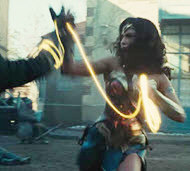
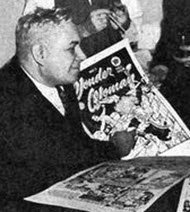
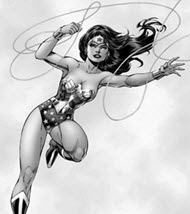

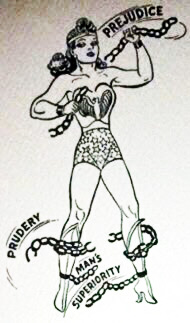
The creator of Wonder Woman was originally a secret. It eventually came to light with the headline, “Noted Psychologist Revealed as Author of Best-Selling ‘Wonder Woman’”. The character and original stories were created by American psychologist William Moulton Marston, Ph.D. (and drawn by Harry Peter who had previously been doing editorial cartoons featuring suffragists). Marston invented the polygraph, hence the Lasso of Truth was featured in his stories.
“FREE LOVE” without restriction— Marston had a mistress (Olive Byrne—a staff writer for Family Circle magazine under the pseudonym Olive Richard—and formerly Dr. Martson’s student in psychology class. She lived with him and his wife Elizabeth Holloway Marston in a long-term polyamorous sexual relationship. (There was at least one other woman in this relationship—Marjorie W. Huntley.) Byrne is credited as being his inspiration for the character’s appearance and the bracelets. Dr. Marston gave the bracelets to Olive as a symbol of their love.
“During the years when she lived with Marston and Holloway, she wore, instead of a wedding ring, a pair of bracelets. Wonder Woman wears those same cuffs.”
BISEXUAL— “She was a little slinky; she was very kinky,” wrote researcher Jill Lepore (Smithsonian Magazine). Wonder Woman DC Comics writer Greg Rucka clearly stated that the character’s sexual orientation is bisexual, and gave her a backstory that includes relationships with women.
Dr. Marston was a fan of PARAPSYCHOLOGY, METAPHYSICS, EROTICISM, BONDAGE AND SUBMISSION, and he worked these into his Wonder Woman stories. Her appearance was similar to Esquire’s Varga pin-up girls (centerfolds) at that time (1940s).
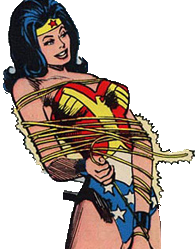
Prior to writing Wonder Woman, he wrote a BDSM novel, Venus With Us. In his Wonder Woman stories, characters are frequently tied up, and her Amazon sisters engage “in frequent wrestling and bondage play… in his other writings and interviews he referred to submission as a noble practice and did not shy away from the sexual implications…”
Her abilities included ESP, astral projection of herself, magic, telepathy, the ability to speak any language and to leave the planet through meditation.
FEMINISM—In writing Wonder Woman, Dr. Marston was strongly inspired by early Feminists, especially contraceptionist and anti-Christian Feminist Margaret Sanger, who secretly was a member of his family—Olive’s aunt.
“Marston hired Joy Hummel to help write Wonder Woman. And Marston’s mistress, Olive, gave her one book and told her to read this and you’ll know how to write Wonder Woman. And that book was… Margaret Sanger’s Woman and the New Race.”
Sanger claimed that promoting sexual abstinence was ridiculous and “is injurious—often highly so.” Her book directly opposed Biblical teachings and attempted to create “a new sex morality,” as well as promoting population control and eugenics to eliminate groups of people she called “defectives” “…to raise the human race on to a higher level.” Sanger insisted that a woman’s “mission is not to enhance the masculine spirit… not to preserve a man-made world, but to create a human world by the infusion of the feminine element into all of its activities.” Out of her work grew a militant Feminist political movement and the Planned Parenthood Federation of America, Inc.
Years later, Mrs. Marston “boasted about how well she had known Sanger.” “I spent a lot of time with M.S., both at her home and mine.”
In 1937 (4 years before Wonder Woman’s introduction), Dr. “Marston held a press conference in which he predicted that women would one day rule the world.” After creating and writing Wonder Woman stories, he said,
“Frankly, Wonder Woman is psychological propaganda for the new type of woman who should, I believe, rule the world.”
Thus, in “Wonder Woman,” a female run society is a virtual paradise—on an island resembling Lesbos. Most of the women are wonderful and good. Without men, most everything is beautiful, and the women mostly live in harmony with Nature. That is, until a MAN appears on the island bringing war in his wake, and everything that is ugly, brutal, corrupt and incompetent.
FEMINIST ICON—“Wonder Woman evolved as a frontrunner of emancipation for the suffragettes who fought for the rights of women in the early 20th century.” In 1971, self-described “radical Feminist” and well known atheist, abortion activist, and Liberal political activist Gloria Steinem placed the character on the cover of Ms. magazine and said,
“Looking back now at these Wonder Woman stories from the ’40s, I am amazed by the strength of their feminist message.”
Wonder Woman was named a “Symbol of Feminist Revolt.” In 1972, Dr. Marston’s wife walked into the offices of Ms. and said, “Hello, I’m Elizabeth Marston, and I know all about Wonder Woman.” She told the staff that she was “100% with them in what they are trying to do and to ‘charge ahead!’” (The following year, abortion was legalized by the U.S. Supreme Court.)
Wonder Woman Researcher Jill Lepore reports that the character owes a debt not only to Feminism, but also “to Greenwich Village bohemianism, socialism, free love, androgyny, sex radicalism…,” etc.
CELEBRATION OF FEMALE EMPOWERMENT—The design decisions for this new “Wonder Woman” film reportedly came primarily from Director …Patty Jenkins and costume designer Lindy Hemming as a “celebration of female empowerment.”
“Hemming crafted a look to show off the Amazons’ ripped shoulders and toned legs, emphasized by wrist braces and heeled sandals, because, Jenkins explained, ‘As a woman, I want Wonder Woman to fight and look great at the same time.’”
Thus, the film gives us a hot Amazon supermodel secretary with super powers—a woman who has no idea how attractive she is, and has the strength to defeat any man and can toss a tank.
In 2016, the United Nations named Wonder Woman a UN Honorary Ambassador for the Empowerment of Women and Girls. Later, due to controversy, she was dropped.
- PAGAN RELIGION—The character is a demigoddess. “A distinctive trait of her characterization is a group of signature mythological exclamations, such as ‘Great Aphrodite!’… ‘Great Hera!’, ‘Merciful Minerva!’, and ‘Suffering Sappho!’” (Sappho is a symbol of female homosexuality or bisexuality.) Some of these exclamations “were contributed by Elizabeth Holloway Marston.” Eventually, Wonder Woman rises to full godhood as the Goddess of Truth.
Sources: The Secret History of Wonder Woman—Knopf 2014, Smithsonian Magazine, NPR, The New Yorker, The Washington Post, The Atlantic, Sanger Papers, Wikipedia, etc.
See list of Relevant Issues—questions-and-answers.


Offenses: It’s implied she and the soldier sleep together, but doesn’t show anything. She mentions they have books in the library that she read that mentions that women don’t need men when it comes to pleasure. The last is that he’s in the tub, she walks in, and he tries getting out of the tub, covering his front, but still there’s some bodily exposure. Loose language is used, but to a moderate extent. See all »
Moral rating: Average / Moviemaking quality: 4
Moral rating: Good / Moviemaking quality: 4½
Moral rating: Good / Moviemaking quality: 4½
Biblically-speaking, there is a shot of near full male nudity, but it only lasts for a few seconds. Either way, it was gratuitous, and should have been cut. See all »
Moral rating: Better than Average / Moviemaking quality: 5
***SPOILER*** She still chooses to anyways! Sound familiar? ***END SPOILER***
The god of war is jealous of Zeus’s creation and how much Zeus loves them. Sound familiar? I’m amazed no one has picked up on this sooner! It is comparable to Narnia. Clearly fictional, but with an amazing underlying truth! Every adult should see it and even young women. It places value on women. That in God’s plan we are just as important and capable. This personally made me want to be on the good side even more. It makes this fight on Earth worth it. That, yes, we will fail, but we can be redeemed.
Moral rating: Better than Average / Moviemaking quality: 4
Moral rating: Better than Average / Moviemaking quality: 5
This is of course a superhero film and functions within the conventions of the genre, good heroes in a ragtag band, evil villains, dysfunctional bureaucrats, and lots of sanitized CGI martial arts violence. Still the message should be one Christians approve of.
Moral rating: Better than Average / Moviemaking quality: 4
If you are unaware of Greek mythology, Wonder Woman is based upon the Amazon Women. Greek mythology is all about lusts of every kind. This movie has some strong implications of that. I felt that this movie review was helpful in pointing out this fact. I want to inform that Greek mythology is about the gods and goddesses. I say this because I notice that some people were upset that “gods” are mentioned in the film. I saw people with small children in the theater watching this film. I would recommend children 14 years old and up. This is not a little child’s movie.
Moral rating: Offensive / Moviemaking quality: 5
When she is a woman, Diana saves the life of a spy, Steve Trevor, and winds up fighting against war in the “War to End All Wars,” the First World War. Although there is very little swearing or profanity to speak of, God’s name is used once in an exclamation of surprise with OMG. I also heard replacements for swear words such as “cripe.” There is some sexual innuendo. The most offensive part is when Diana comes across Steve when he is swimming. He stands up, obviously naked, and she asks, “What is that?” which makes the viewer feel she is referring to male anatomy, something we assume she has not seen in a female only society. We see frontal nudity with his hand covering his private parts. Later in the film, we see them kissing, and the assumption could be made that they make love, although there are no remarks about it later to indicate that anything happened. There is also an earlier scene when Steve says that sex should not be assumed unless you are married. There is talk that only love can save the world. See all »
Moral rating: Average / Moviemaking quality: 4½
Sounds good, eh? (only if you don’t know your Bible and haven’t been born again, perhaps). However… Jesus is not the Son of God in this film, and the Father isn’t even God. It’s Zeus and the Greek pantheon.
I have no problem with a fantasy film, but to put this “theology” into a more contemporary setting, and even have the heroine blow up a church steeple and bell tower (where a sniper was hiding), then to stand upon it in triumph is a not-so-subtle message of what “works” and what doesn’t. See all »
Moral rating: Average / Moviemaking quality: 5
Compelled to speak the truth (being bound by Wonder Womans, er, “lasso of truth”), the first sentence Ares utters is “I am.” Which happens to be the personal name of God in the Bible. Anyway, all gods are dead except for two: Ares and Diana (a.k.a. Wonder Woman). Ares wants to destroy humanity and starts World War I. Diana believes in us, kills Ares, and ends the war. Now, there’s a single god alive—Diana.
This movie is entertaining, no doubt. But these spiritual undertones appear to be purposeful.
Moral rating: Extremely Offensive / Moviemaking quality:
It was very slow the first hour and much didn’t happen after the beginning, lots of talking, which was surprising. The real action didn’t happen until the end, and the movie was 2 hours and 20 minutes. I was surprised this was such a huge hit, but, also, it’s sad because there are so many confused people out there with spirituality and that will only confuse them more. See all »
Moral rating: Very Offensive / Moviemaking quality: 3
In retrospect, I did not like the juxtaposition of fantasy and reality and the very odd presence of humor that had no place in such a serious movie about people and nations killing each other. PG-13 is not an adequate rating.
Moral rating: Very Offensive / Moviemaking quality: 4
2—This is a fantasy/action movie, but there is not much action, and the mixing of fantasy with an element of warped history does not help, either. Of course, the producers were aware of what they were doing. They deliberately depicted the Turks as the partners of the Nazi Germans who developed chemical weapons during WWI. Sorry, I am not a 5 year old, and I know for sure that Nazi Germany had not existed until 1930s and the Turks had stayed neutral during WWII. Actually, to the contrary of what the movie shows, the Turks saved a lot of Jews from the hands of the Nazis. See all »
Moral rating: Offensive / Moviemaking quality: 4
One good thing stands out… the women are not victims. Gal Gadot, the actress who plays Wonder Woman, does not have any misgivings about what she is about to do… she simply does it. Each of the Amazons does not let a man take control of her, sending the clear message that a single woman does not belong to any man who happens to come along.
Yet, this leads me to the final point… which is negative. We can see that although Wonder Woman is not owned by any man, the viewer can easily see that she, or any Amazon, will not be (I didn’t say cannot be) romantically involved with just one man. Feminism takes the worst qualities of males and gives them to females, with the only difference being that how a woman expresses these qualities is generally more subtle.
Instead of showing over-the-top bravado like a man, she will assert opinions with force… both man and woman doing so without considering if their opinion is actually valid. Or, the propensity of males to capture women in the ancient days and have a harem full of victories might not be exactly copied by a feminist, but she will leave a string of men behind her as her emotional conquests. I did not appreciate the fact that Diana said she could swing either way, or that men were seen (in the Amazon philosophy as a whole) as merely a means to an end… intimacy between a man and a woman is seen as amounting to nothing in this movie, except where Captain Kirk, the alpha male, proves her wrong… for a time.
Overall, the feeling of this movie is not about equality of woman and men, it is about the divinely implied nature of women and the demented, deteriorated, bull-headed, insufferable, though sometimes tolerated, and affectionized men… even though Zeus created the Amazons and was a male.
Moral rating: Offensive / Moviemaking quality: 4
Some may say that this is no big deal, it is similar to when Paul says if eating food offered to idols is sin to one, then let it be sin to one, but, quite honestly, this isn’t that, this is something worse. It isn’t about how mature one is, one can be really strong and mature in Christ, but even that person will sense something off about watching such filth in the movie theatres. I can understand watching it at home with only a family of believers or friends, where certain scenes can be skipped and such, but a movie theatre where Hollywood is directly being contributed? It is almost like going to a pagan temple, where you and the rest of the unbelievers gather together, and then tithe (pay) to pleasure your flesh and view mockery of God and His values, blaspheming Jesus, perversions, and all forms of wickedness, as you and the others (unbelievers) laugh, clap, and essentially participate in a form of “worship.” See all »
Moral rating: Very Offensive / Moviemaking quality: 4½
—Neil, age 23 (Canada)
Moral rating: Average / Moviemaking quality: 2½
Now the rest of the movie is just extremely boring, and, as an animal lover, the scene that upset me the most was the scene where people were mistreating some horses, I looked on the IMDb plot keywords before watching, and there was no warning of that at all, if there was, I wouldn’t have watched this.
Overall, this is just a non-fun flick.
Moral rating: / Moviemaking quality: no opinion
Moral rating: Extremely Offensive / Moviemaking quality:
Moral rating: Excellent! / Moviemaking quality: 5
Moral rating: Average / Moviemaking quality: 3
Moral rating: Average / Moviemaking quality: 5
Some of the messages and themes in the movie often paralleled important Biblical themes. For instance, that love is the strongest thing in the world (like God saved us because he loved us), and, of course, the whole “it doesn’t matter if people deserve to be saved” (We sure didn’t deserve for Jesus to die for us, but he did because he loved us). See all »
Moral rating: Better than Average / Moviemaking quality: 5
What also came to mind was that in the stories Hades was only allowed on Mount Olympus on the Summer and Winter solstice. So if Aries supposedly killed all the gods it would have to be one of those days and if it wasn’t then Hades perfectly healthy sitting on his throne in the underworld. Say it was the summer or winter solstice then how would Aries be able to take on 7 gods and 6 goddesses. Yes he is the god of war but that doesn’t mean he would be able to take all of them on at the same time.
Moral rating: Good / Moviemaking quality: 4
PLEASE share your observations and insights to be posted here.
If so many of us “Christians,” weren’t more or less unscrupulous about the entertainment we purchase (Christianity is still the majority religion), then Hollywood wouldn’t be able to afford constantly indoctrinating our youth with these propaganda films. We get what we’re paying for. When mainstream Christians realize that we’re being assaulted in a culture war, and that we are losing, maybe people will begin putting their money where it counts, and we’ll start making a difference. It’s time for “deplorables” to boycott Hollywood!
Moral rating: / Moviemaking quality:
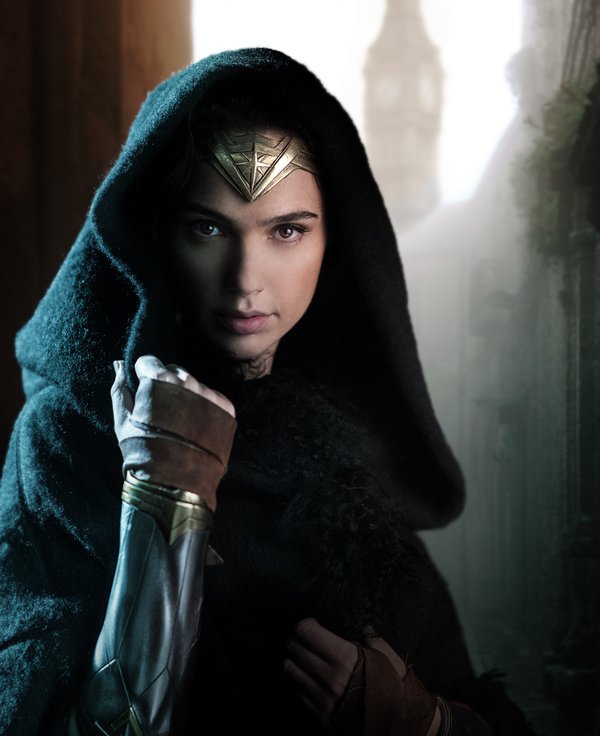
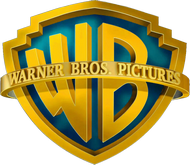
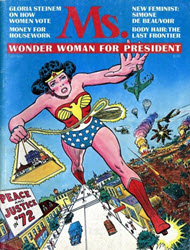
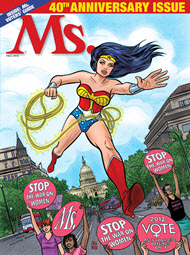
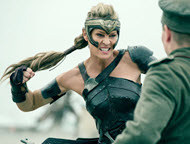
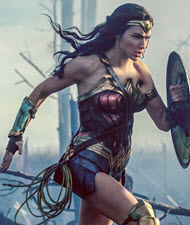
Not that “Wonder Woman” is without faults. There is no shortage of beautiful Amazons, and while I can praise the film for not taking gratuitous advantage of this, there is a scene where Diana interrupts Steve Trevor [Chris Pine] bathing—a distant shot shows him almost entirely naked. Much later in the film, it is implied that these two sleep together (a move which seems wildly out of character for both). See all »
My Ratings: Moral rating: Better than Average / Moviemaking quality: 4